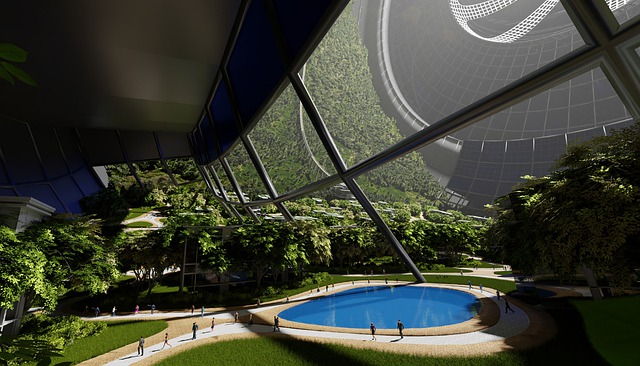
Off-World Habitation: A Stimulus for Sustainability on Earth
We all know that the space industry provides us with various opportunities that will enhance different aspects of life and work on Earth. But did you know that within space exploration lies the potential for sustainability on our planet?
From pioneering advancements in renewable energy to monitoring and mitigating climate change, the space industry holds the key to unlocking sustainable solutions that can benefit not only our extraterrestrial endeavors but also the preservation and well-being of our own precious Earth.
Pioneering the Path to a Greener Future
The future colonization of the lunar and Martian surfaces will demand resourcefulness, circularity, and sustainability to ensure the survival of these colonies.
With the need to reuse, repair, and recycle almost every substance to maximize utility and minimize waste, the principles of hyper-resourcefulness and circularity in these extraterrestrial settlements hold the promise of generating offshoot technologies that can foster sustainable development back on our home planet.
As we strive to establish habitats beyond Earth, we may discover innovative solutions that can address pressing environmental challenges and propel us toward a more sustainable future.
Harnessing Space Innovation for Sustainable Solutions
While the Apollo program incurred a substantial cost of $280 billion in today’s dollars, it served as a catalyst for groundbreaking technologies that continue to have a positive impact to this day. Notable advancements resulting from this investment include solar cells, miniaturized computer processors, advanced insulation materials, fuel cells, and compact cameras.
Moreover, the exploration of space has led to the development of modern satellite technologies, which play a crucial role in our contemporary way of life.
Communication satellites have become indispensable, and Earth observation satellites have emerged as essential tools in the fight against climate change. These satellites enable the monitoring of discrepancies in CO2, methane, and other greenhouse gas (GHG) emissions, as well as the assessment of forestry, agriculture, and land use practices, which collectively account for 24% of global GHG emissions.
Sustainable Exploration: Charting a Path in the New Space Economy
The growing attention and significance of the space sector, now recognized as the New Space Economy, have necessitated the emergence of a new class of professionals: managers.
While scientists and technicians have long been integral to the space industry, there is a need for individuals who possess managerial competencies to effectively navigate the complexities of this dynamic field. In response to this demand, our course aims to provide highly specialized professionals operating in the space sector, or those aspiring to enter it, with the essential managerial skills and knowledge required to excel in top positions.
As a current master in space business management nicely puts it, the New Space Economy presents a unique opportunity to merge scientific and technological expertise with strategic management principles, paving the way for groundbreaking advancements and transformative leadership in the exploration of outer space.
By equipping professionals with the tools to effectively manage resources, navigate complex challenges, and inspire teams, education in this field will cultivate their potential for success in the ever-expanding and exciting realm of space exploration and innovation. Only through the intersection of science, technology, and strategic management can we pave the way for a sustainable path.
Revolutionizing Off-World Construction: Innovations in Materials and Processes
Off-world habitats face a significant and unresolved challenge when it comes to the development of viable construction materials and processes. Unlike construction on Earth, which relies on a multitude of diverse materials sourced through complex supply chains and assembled by specialized labor, off-world environments lack the luxury of such options.
As a result, there is a pressing need to pioneer new material technologies and innovative construction methods specifically tailored for extraterrestrial conditions.
This field has given rise to several innovative proposals for bio-based or living construction methods that offer a relatively low-energy and feasible approach to stabilize the regolith found on extraterrestrial surfaces and transform it into viable construction materials.
These advancements have the potential to revolutionize the way we approach construction in space, reducing reliance on resource-intensive methods while maximizing the utilization of local resources. By merging the realms of biology and materials science, we can pave the way for sustainable and self-sufficient extraterrestrial colonies while inspiring breakthroughs in sustainable construction practices here on Earth.
Conclusion
As we are aware that challenges of sustainability are becoming increasingly urgent, the prospect of off-world habitation offers not only an unprecedented frontier for human exploration but also a potential stimulus for sustainability on Earth. As we venture into the cosmos, driven by our insatiable curiosity and a quest for knowledge, we are also propelled to develop innovative technologies, adopt resource-efficient practices, and cultivate a deeper understanding of our fragile planet.
 WhosGreenOnline.com Your Online Magazine and Directory for Green Business, Product, Service and News!
WhosGreenOnline.com Your Online Magazine and Directory for Green Business, Product, Service and News!

